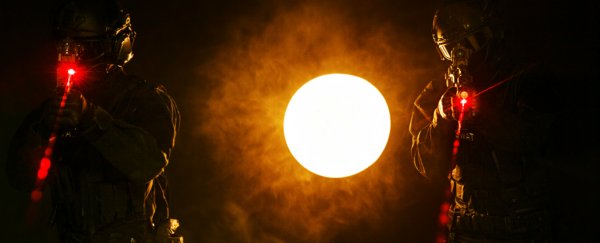
For the US Department of Defense (DoD), killing people isn’t all that complicated. A budget of more than US$600 billion per year buys a whole lot of tanks, guns, and bombs.
But not killing someone proves to be a bit more complicated. How about just stunning them a bit from far away? Or maybe setting their clothes on fire without having to look them in the face?
For that, we’ve got the Joint Non-Lethal Weapons Development Program (JNLWD).
The program’s purpose: to develop weapons and other devices military personnel can use to incapacitate targets without outright killing them.
As explained on the program’s FAQ, the goal of the JNLWD is to fill the gap between “shout and shoot” (truly, we should all be grateful the armed forces acknowledge that such a gap exists).
The JNLWD’s latest breakthrough is the Non-Lethal Laser-Induced Plasma Effect (NL-LIPE) system. They recently gaveDefense One a look at the in-development device. And it’s truly a sight to behold.
Rather, a sound to behold. Take a listen below (and maybe make sure your pets are out of the room because, we promise, they really hate this).
Here’s how this device is useful.
Imagine an enemy is getting a bit too close for comfort, and you want them to back off.
You could use a stun grenade, a blinding flash of light and noise that leaves the enemy disoriented and stunned. Those only work if you’re close enough to throw them, though.
And maybe you have some good guys standing in between. How do you blast the enemy but not the good guys? That’s where the lasers come in.
First, the NL-LIPE operator shoots a burst of light at the target using a femtosecond laser. This rips electrons from the air molecules to create a ball of plasma at the targeted site.
The operator then manipulates the plasma ball using a second nanolaser, directing the plasma to produce sound or light, or even burn clothing.
Right now, of course, the technology is still in development, so it only works under pretty specific conditions.
Eventually, though, the military thinks it could get the device to work at distances of tens of kilometers, David Law, head of JNLWD’s technology division, told Defense One.
That would give it a longer range than any other non-lethal weapon.
Law also said the researchers believe they’re very close to getting their device to outright “speak” to them, but the creepy almost-voice it already produces would likely be enough to get any enemies to turn tail.
ATTENTION! ATTENTION!! ATTENTION!!! ADVERTISE ON TOKTOK9JA AND REACH OUT TO YOUR DESIRED AUDIENCE: HERE
Discover more from TOKTOK9JA MEDIA
Subscribe to get the latest posts sent to your email.






























